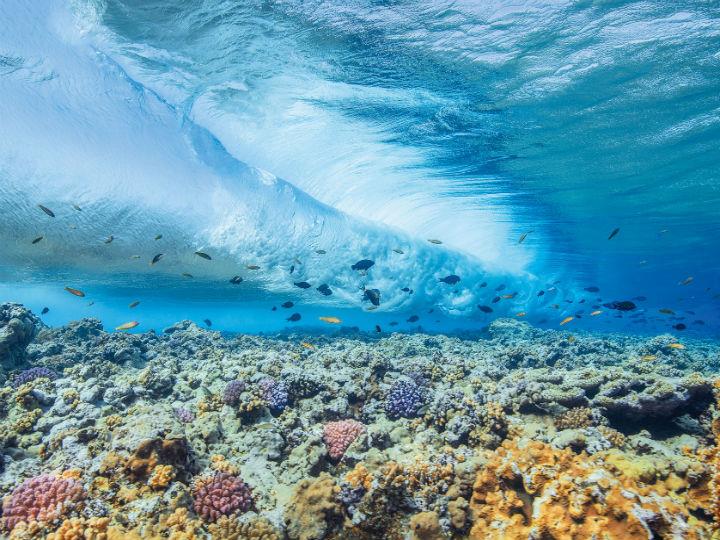by Emily Kelly and Elena Perez*
The ocean is the Earth’s natural climate moderator – regulating climate and influencing weather patterns around the globe and affecting every one of us, even if we don’t live by the coast.
As human activities have significantly increased greenhouse gas emissions, the ocean has moderated the effects, absorbing more than 90% of excess heat and approximately 30% of excess carbon emissions, sparing us from the extreme impacts we would otherwise experience on Earth.
Despite this moderation, changes have still been felt around the world with warmer seas linked to increasing droughts in Central Africa, changing precipitation patterns in the Midwestern US and more intense flooding in South-East Asia.
Climate change is affecting the ocean – and us
While the ocean has been a buffer to humans on land from the full consequences of our emissions, the excess heat and carbon absorbed by the ocean are changing marine ecosystems to the detriment of the animals and plants in these systems and the people who rely on them.
Ocean acidification
As the ocean absorbs more carbon dioxide, the pH of the water decreases, making it more acidic and hindering the ability of marine organisms to make the shell and skeleton structures on which they rely for survival. This affects plankton, coral reefs, oysters, sea urchins, clams and more. Ocean acidification thereby undermines the base of the food web, critical fish habitats, commercial fisheries and the coastal ecosystems that protect our shorelines.
Reduced oxygen levels
Warmer ocean surface waters result in increased ocean stratification, which means there is less ocean mixing, which would normally help deliver oxygen from surface waters to the deep. This intensified physical barrier in surface and deep waters has contributed to reduced oxygen levels in the ocean, suffocating many marine species in deeper waters or causing them to relocate. Species affected include ones that we eat or depend on for livelihood.
Marine heatwaves
Although less immediately apparent to us than the heatwaves we experience on land, marine heatwaves can be just as disruptive to underwater ecosystems, since the temperature shift happens quickly, with little time for marine organisms to adapt or respond. As ocean temperatures increase, we’re seeing an increase in marine heatwaves, as well.
Melting sea ice
Sea ice influences global weather patterns, with the white surface of the ice reflecting sunlight and its heat back into the atmosphere. But with higher oceanic and atmospheric temperatures, sea ice has been melting. In the absence of sea ice, the darker ocean absorbs the sun’s heat, leading to positive feedback in which warmer water and warmer air melt more sea ice, exposing more ocean.
This process has global implications for climate. Loss of sea ice also directly impacts the people and animals that live in and adjacent to it. Inuit people who have lived in the Arctic for 20,000 years are seeing an unprecedented and swift change to their homes and livelihoods.
The ocean is reaching its tipping point. We are starting to see rapid changes to ocean chemistry, marine ecosystems, ocean livelihoods, weather patterns worldwide and natural disasters globally that impact us all.
We must act
These ocean changes may seem far from home for many, but the ocean’s influence doesn’t stop at the coastline.
Changing ocean temperatures and ocean chemistry threaten global food security, particularly devastating to developing countries that heavily depend on seafood as a vital source of protein. Melting ice sheets and glacier ice melt hasten the rise in sea levels, leaving coastal communities and critical coastal infrastructure at risk of flooding and erosion.
The warming ocean has not only led to rising sea levels but also increased storm intensity, making our coastlines even more vulnerable to extreme weather events. Meanwhile, climate disasters can upend lives and livelihoods, triggering climate migration, destabilizing nations and threatening national security.
How ocean solutions can combat climate change
The ocean can help us turn the tide and holds a portfolio of options to combat climate change.
1. Mitigation
Marine ecosystems can store a significant amount of carbon, which could help offset carbon emissions while industries transition to zero-emission practices. ’Blue carbon’ markets are complex, and investment should support the local communities critical for the effective management of blue carbon ecosystems to ensure local buy-in, necessary for success. Depending on the location, ocean renewables, such as offshore wind energy, might play an important role in reducing carbon emissions, as well.
2. Adaptation
A healthy ocean has a better chance of adapting to and rebounding from climate change impacts, which means people have a better chance of adapting and rebounding, too.
The type of seaweed that garners a higher price can no longer survive the warming temperatures in the shallow waters of the Western Indian Ocean, notes Dr. Flower Msuya, Senior Researcher and Chairperson at the Zanzibar Seaweed Cluster Initiative. Now, seaweed farmers must harvest a less valuable species, while those with access to boats can harvest the higher-value species located in the deeper, colder waters offshore. Adaptation planning can help prepare local and global communities alike for climate change.
3. Protection
Ocean protection enables marine ecosystems to better endure ocean changes, such as ocean acidification, reduced oxygen and increased heat, so these systems can continue to provide the resources we depend on to live. The focus of the UN Decade on Ecosystem Restoration underscores how essential our natural environment is – and nature-based solutions take advantage of natural benefits for our own well-being.
4. Strengthening resilience
As the private sector evaluates supply chain vulnerabilities, climate risk exposure and the value of long-term resilience, the benefits of healthy coastal ecosystems will shine. Coastal ecosystems, from mangroves to coral reefs, strengthen our own resilience to climate change impacts, providing us with natural defences to better withstand storm surge and extreme weather events, and improving our capacity to safeguard critical infrastructure and communities.
Why we need to include everyone
Adaptation, mitigation, resilience and protection measures must be inclusive and just if we want to make effective change. We must ensure that the benefits realized from a transition to zero emissions are distributed equitably and that we all come together to shoulder the costs and the burdens, especially in support of nations with fewer resources.
We know a healthy ocean provides us with the resources necessary to sustain life – knowledge that indigenous people and local communities have passed down from one generation to the next. This underscores the importance of incorporating traditional ecological knowledge. We must learn from local experience as we develop the solutions to combat the very serious climate crisis we face and bring an inclusive perspective into the UN Decade of Ocean Science for Sustainable Development.
Increased transparency and accountability can also lay the foundation for more inclusive decision-making processes that drive more equitable outcomes.
Young people raising their voices for climate action do so facing a future robbed of a healthy planet. More equitable outcomes must consider the generations that will inherit the consequences of our choices today.
*Hoffmann Fellow, 4IR for the Earth, World Economic Forum and Lead, Ocean Action Agenda, World Economic Forum
**first published in: www.weforum.org




 By: N. Peter Kramer
By: N. Peter Kramer
